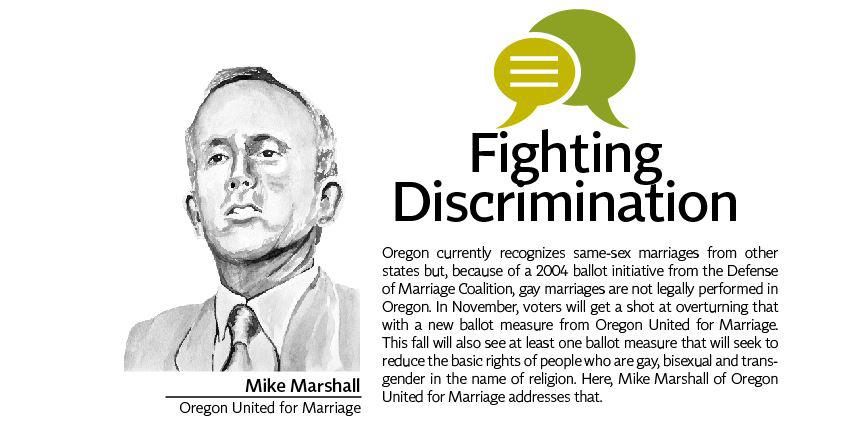illustration by Paul Harris
At a time when we should be celebrating the imminent end of discrimination against same-sex couples, we’re gearing up to fight another effort to discriminate against people who are gay, lesbian, bisexual and transgender. Oregon, once again, is the state where the opposition is focusing its efforts.
In substance, the proposed law in Oregon that is making its way toward the ballot is almost identical to the bill Arizona’s governor recently vetoed. The Oregon version of the law would allow businesses to turn people away because of who they are and whom they love. Treating people differently because of who they are is discrimination.
But in practice, Oregon’s law is particularly dangerous because the opposition is trying something new—and something that every equality-minded American should care about. Rather than going through the state legislature, the opposition is putting their discrimination measure up to a vote of the people.
We will be the first state to face this issue at the ballot, and we know, based on our experience, what this means. The opposition is using Oregon as its testing ground, developing campaign strategies here so that they can export them during the next presidential election.
This is the same playbook they developed in 2004, when they used the constitutional amendments that excluded same-sex couples to drive turnout of conservative voters during the presidential election. After passing constitutional amendments in Oregon and other states in 2004, the opposition went on to export their campaigns to the rest of the country. Today, we’re still feeling the consequences of the discriminatory laws that were passed.
Oregon has faced thirty-five anti-gay ballot measures, more than any other state, and Oregon has long been the testing ground for anti-gay ballot measures that spread to other states and continents. The most famous example comes from Scott Lively, a founder of Oregon’s anti-gay movement. He cut his teeth in Oregon. After developing his tactics and strategies here, he took them worldwide, helping lead the effort to criminalize homosexuality in countries such as Russia and Uganda.
For better and for worse, Oregon is to LGBT equality campaigns what Iowa is to presidential campaigns: a bellwether state that shapes campaigns elsewhere. Opponents and advocates of equality know this, and both sides are gearing up for a major fight.
In some ways, we are in a good place to win. For marriage, poll after poll shows a growing majority of Oregonians support the freedom to marry. On April 23, a federal judge is hearing a case that could soon grant same-sex couples marriage in Oregon. Nine federal judges have ruled for marriage in the last nine cases. But if this judge should rule against us, we have collected 160,000 signatures, enough to qualify a measure for the November ballot, so that Oregonians can vote to extend the freedom to marry to same-sex couples.
With the new discrimination measure, early indicators suggest we can also win that campaign, but it could be tough. Nonetheless, I believe Oregonians will be on the right side of history. As a state and as a nation, we have decided that discrimination is counter to who we are and the values that we share. We believe in treating others as one would hope to be treated, not singling them out for unfair treatment.
We need to stop this discrimination measure, and we have to win big so that the opposition’s discrimination campaign is not exported to other states. Now that we’ve won the freedom to marry, we have to step up to defend it.









